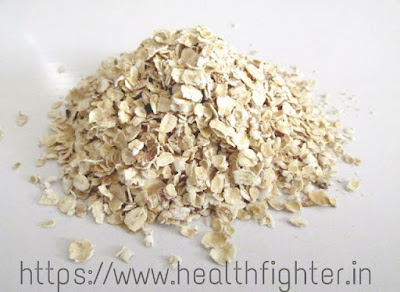Are oats good for you?
· Oats (Avena sativa) is a cereal
commonly eaten in the form of oatmeal or rolled oats. According to some
research, they may have a range of potential health benefits.
They are mainly eaten as porridge, as an
ingredient in breakfast cereals, and in baked goods (oatcakes, oat cookies, and
oat bread). Over the past few decades, oats have become a very popular “health
food.”
Oats are loaded with dietary fiber (containing more than many
other grains) and have a range of healthy cholesterol-lowering properties.
This MNT Knowledge Center feature is part of
a collection of articles on the health benefits of popular foods.
We will cover any health benefits that oats might have and explain the research
behind these claims.
Benefits
The possible health benefits of oats include reducing the risk
of coronary artery disease, lowering levels of cholesterol, and
reducing one’s risk of colorectal cancer.
1) Oats and coronary artery disease
A paper published in the American
Journal of Lifestyle Medicine in 2008, assessed a number of
studies across more than a decade.
They found that eating foods rich in whole-oat sources of
soluble fiber (oats, oat bran, and oat flour) may help reduce the risk of
coronary heart disease.
They concluded:
“Consumption of oats and oat-based products significantly
reduces total cholesterol and low-density lipoprotein cholesterol concentrations
without adverse effects on high-density lipoprotein cholesterol or triglyceride
concentrations.”
2) Colorectal cancer
Researchers in Britain and the Netherlands pooled published
evidence that covered nearly 2 million people to evaluate whether a high-fiber
diet (mainly from whole grains and cereals like oats) is linked to a lower
risk of colorectal cancer. Their findings were published in BMJ.
The study found that for every additional 10 grams per day of
fiber in someone’s diet there is a 10 percent reduction in their risk of
developing colorectal cancer. The authors concluded, “A high intake of dietary
fiber, in particular, cereal fiber and whole grains, was associated with a
reduced risk of colorectal cancer.”
3) Blood pressure
An article published in the American Journal of Clinical
Nutrition concluded that a diet including plenty of whole-grains (such as
oats or wholemeal bread) is just as effective as taking anti-hypertensive
medication in lowering blood pressure.
They found that three portions per day can “significantly reduce
cardiovascular disease risk in middle-aged people mainly through blood
pressure-lowering mechanisms.”
4)
Digestion and obesity
According to a
wide-reaching collection of scientific reviews published in the October 2014 supplement
issue of the British Journal of Nutrition, oats may play an important role in improving satiety (the feeling of fullness), diet quality,
and digestive, cardiovascular, and general metabolic health.
Whole grains are often
recommended for their beneficial effects on the gastrointestinal tract. The
researchers suggest potential health effects ranging from improved immune
health to reducing the risk of obesity and chronic disease.
According to the
supplement, epidemiological evidence suggests that regular consumption of
whole-grain foods may be correlated with a lower body mass index (BMI). The
researchers state that eating oats appears to help reduce hunger and increase
feelings of fullness.
Also, oats and their
fiber content help keep the gastrointestinal tract running smoothly; they can
help reduce constipation.
5)
Antioxidants in oats
Oats contain a range of
molecules that act as antioxidants; this includes Avenanthramides, which are
polyphenols. Avenanthramides may play a role in keeping blood pressure low by
increasing nitric oxide production. They could also have anti-inflammatory
and anti-itching properties when applied topically to the skin.
Nutrition
Dietary fiber — oats are rich in a specific type of fiber
called beta-glucan. This particular type of fiber is known to help lower levels
of bad cholesterol. One cup (81 grams) of dry oats contains 7.5 grams of
fiber, the recommended daily intake of fiber is 25 grams for women and 38 grams
for men.
Minerals — oats are rich in a range of important
minerals, vitamins, and antioxidants. Just 100 grams of oats
contain:
- 51 percent of the daily recommended intake of
thiamine
- 8 percent riboflavin
- 5 percent niacin
- 6 percent vitamin B6
- 14 percent folate
- 13 percent pantothenic acid
- 26 percent iron
- 44 percent magnesium
- 52 percent phosphorus
- 12 percent potassium
- 26 percent zinc
- 31 percent copper
- 246 percent manganese
Calories — one cup of dry oats (80g) contains
approximately 297 Calories.
Risks
Although oats do not
contain gluten, in rare cases, they are grown in the same fields as wheat or
barley and these crops can sometimes contaminate oats with gluten. Therefore,
those who have gluten intolerance or celiac disease may have to
exercise caution when eating oats.
Oats
 Reviewed by HealthFighter
on
February 23, 2020
Rating:
Reviewed by HealthFighter
on
February 23, 2020
Rating:
 Reviewed by HealthFighter
on
February 23, 2020
Rating:
Reviewed by HealthFighter
on
February 23, 2020
Rating:






No comments:
Please do not enter any spam links in the comment box